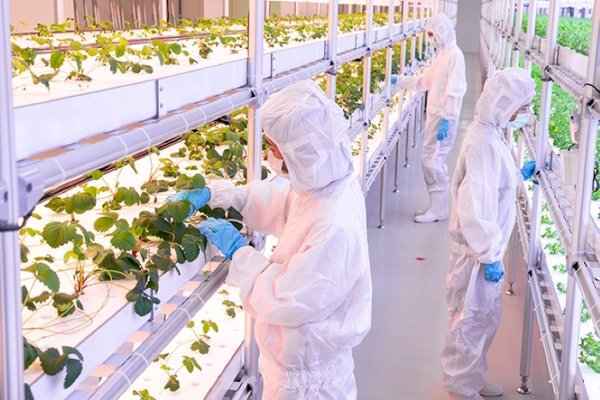Thailand's Eastern Economic Corridor to Become Post-COVID Global Food Innovation Hub
BANGKOK,Oct. 6,2020 -- Thailand's high-tech Eastern Economic Corridor (EEC),already positioning itself as the gateway to Asia,is aiming for a new post-COVID-19 role asincubator of innovative food products to nourish the world,officials said.

"Facilities such as this brand-new plant factory,developed by Thailand’s National Science and Technology Development Agency using cutting-edge technology to enhance the quality and productivity of plants,will be built on a bigger scale in the EECi in the near future."
With its fertile farmland and abundant seafood resources,Thailand has long been one of the few countries that can produce far more food than it consumes. Nicknamed "the kitchen of the world",and well known for its high-quality standards,Thailand last year exported $33 billion worth of produce ranging from rice to ready meals to tropical fruits.
But with the United Nations predicting that global demand for food will rise by 60 percent within the next 10 years,and with COVID-19 disruption adding to food insecurity in many countries,the Thai government believes it can further leverage technology,innovation and logistics to raise the food sector to even greater heights.
As part of a strategy known as Thailand 4.0,the government has designated "food for the future" and "advanced agriculture and biotechnology" among the 12 target industries to be prioritized in the EEC to spearhead the transformation of the kingdom into a fully developed innovation economy.
The EEC,a 13,000 square kilometer zone south and east of Bangkok,is the focal point of Thailand 4.0. And opening in the heart of the EEC will be the Eastern Economic Corridor of Innovation,or EECi,where some of the EEC's most advanced research and development will take place.
Two key components of the EECi will be Biopolis,an innovation center for biotechnology,which will open in 2021,and Food Innopolis,a science park in which giant multinational companies and universities research,develop and innovate alongside "agropreneur" startups and small and medium sized enterprises. They will be complemented by Aripolis,specializing in automation,robotics and intelligent systems.
"The EEC's agricultural promotion plan encourages the use of technology,and smart farming to increase the area's full potential as a hub of tropical fruit production," said Dr Luxmon Attapich,Deputy Secretary-General of the Eastern Economic Corridor Office. "Beyond final products,with the help of biotechnology,we also target up-stream production and raw materials for innovation in the health and wellbeing related industries,such as functional food,food additives,and food supplement."
Food Innopolis,which is part of the National Science and Technology Development Agency (NSTDA) already operates campuses in Bangkok and major provincial cities. But by expanding into the EEC,where the government and private sector is investing some $45 billion on infrastructure and business development,food companies will be able to upscale their activities,said Dr Luxmon.
"We are already in discussion with potential investors so that by the time the EECi is ready they can begin their operations," Dr Luxmon added. "Technology and food can bring high value added."
In addition to being at the center of innovation,the EECi offers food companies the EEC's unmatched connectivity,boasting three international airports -- all soon to be linked by high-speed rail – and three sea ports. An imminent upgrade to 5G telecommunications will enable food producers to take smart farming techniques to a new level with big data supplied by drones and satellites Dr Luxmon said.
Even at the height of the COVID-19 lockdown,when many supply chains in other countries crumbled,Thai farmers and food manufacturers were able to get their products to market. Partly this was due to Thailand's success in containing the virus; partly also to Thailand's location and logistics that gives producers easy access to the 620 million who live in Southeast Asia's ASEAN Economic Community free trade zone,and beyond that to all of Asia and the World.
"We believe that Thailand is perfect to be the hub of food innovation in Asia," said Dr Akkharawit Kanjana-Opas,Chief Executive Officer of Food Innopolis.
Investors are taking note. International companies such as Dupont of the U.S.,Yamamori of Japan and European giants Unilever,Danone and Nestle are using Thailand as a base to develop new value-added products,Dr Akkharawit said.
While much of those companies' activities remain "commercial in confidence",Dr Akkharawit said they often involve so-called "functional food" that,when processed,can provide consumers with much more than simply calorie intake.
Dr Akkharawit cited the example of MK Foods,a popular Thai restaurant group. MK scientists developed a milk drink containing extract from mulberries that studies have shown may help improve the memory and reduce stress levels. "The world has not yet realized the potential of the ingredients we have here," Dr Akkharawit said.
Researchers in the EEC are finding uses for byproducts of mangosteen skins and shrimp shells,which can be used in extract form in medicines and cosmetics,and discovering new properties of the country's famed chili peppers.
Under a pilot project between the NSTDA and Bangkok Lab & Cosmetic Company,capsaicin,an active component extracted from the chilies,is used to make dietary supplements such as slimming capsules. The project will further extend once the Biorefinery planned in the EECi's Biopolis opens. The Biorefinery will be used to convert agricultural products or byproductsinto bioingredients and bioactive compounds which will in turn be key substances in the making of innovative food products.
Even after feeding 70 million Thais and the 40 million tourists who flock to the country in normal years,there remains a Hefty surplus for export. As Dr Akkharawit puts it: "If you can feed Thailand,you can feed the world."
Photo - /20201006/2940928-1?lang=0